ARKAMIN 0.1MG (100 mcg)
Antihypertensives are used to treat high blood pressure, which ARKAMIN 100 MCG TABLET belongs to. Also used to treat attention deficit hyperactivity disorder (ADHD) in adolescents aged 6 and older, either alone or in conjunction with other medications. Hypertension (high blood pressure) is a medical condition caused by the blood exerting an inordinate amount of pressure on the walls of blood vessels. It is a common condition that, if left untreated, can damage blood vessels, the brain, the kidneys, the heart, and other organs. ADHD is a condition in which a patient has difficulty focusing, managing behaviors, and remaining silent or still in comparison to other individuals of the same age.
Clonidine, an active component in ARKAMIN 100 MCG TABLET, relaxes and dilates blood vessels, making it simpler for the heart to pump blood to all areas of the body. In turn, this helps individuals with high blood pressure lower their blood pressure and reduce their risk of future heart attack or stroke. ARKAMIN 100 MCG TABLET also assists in the treatment of attention deficit hyperactivity disorder by modifying the region of the brain that regulates impulsivity and attention (ADHD).
It is permissible to consume ARKAMIN 100 MCG TABLET with or without sustenance. The tablet should be consumed whole with a glass of water; it should not be chewed, split, or crushed. Take one ARKAMIN 100 MCG TABLET daily at the same time. ARKAMIN 100 MCG TABLET should be taken for as long as prescribed by your doctor, based on your medical condition. In some instances, common adverse effects such as headache, fatigue, parched mouth, lethargy, nausea, vomiting, diarrhea, and constipation may occur. The majority of these side effects do not require medical intervention and will subside over time. However, if you experience these side effects frequently, you should consult your physician.
Continue taking ARKAMIN 100 MCG TABLET for as long as your doctor recommends to treat your condition effectively. Avoid omitting doses or abruptly discontinuing ARKAMIN 100 MCG TABLET without first consulting your doctor, as withdrawal symptoms including anxiety, headache, tremor, agitation, and a rise in blood pressure may occur. Regular monitoring of blood pressure, electrolyte levels, and kidney function is recommended while taking ARKAMIN 0.1MG TABLET. While taking ARKAMIN 0.1MG TABLET, you should consume a diet low in sodium and fat. If you are pregnant or nursing, you should not consume ARKAMIN 100 MCG TABLET. Children should not be given ARKAMIN 100 MCG TABLET unless a doctor has recommended it. Alcohol should be avoided while taking ARKAMIN 100 MCG TABLET, as it may exacerbate certain side effects. Inform your doctor of all the medications you’re taking and your current state of health in order to rule out any adverse effects.
Hypertension (high blood pressure) and Attention Deficit Hyperactivity Disorder (ADHD) are treated with ARKAMIN 0.1MG TABLET (ADHD)
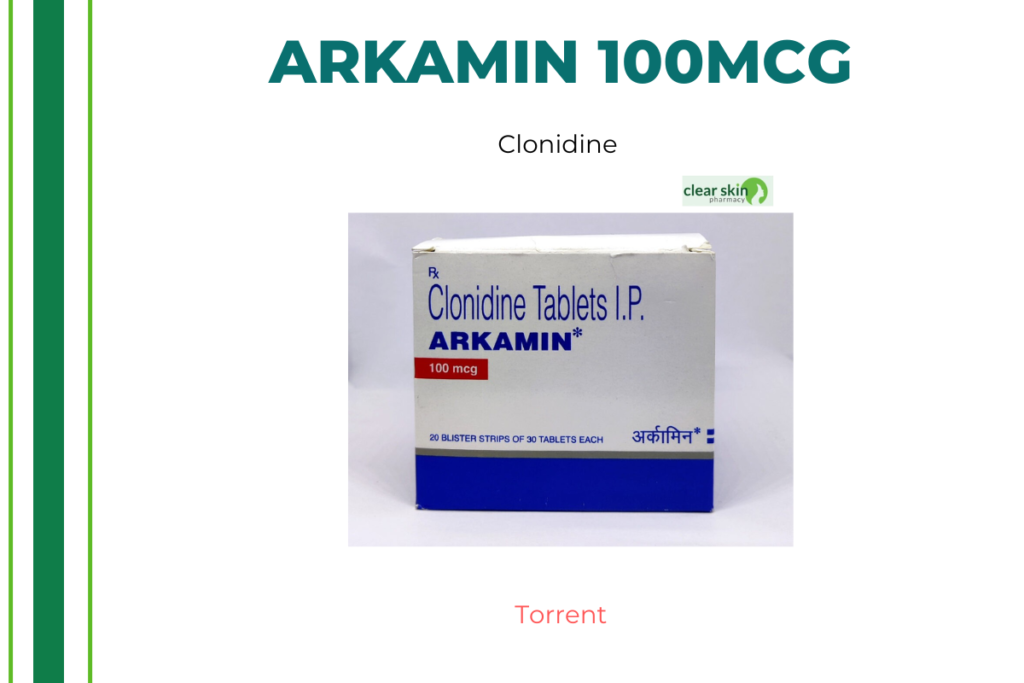
Medicinal Advantages
Antihypertensive medication ARKAMIN 100 MCG TABLET is used to treat high blood pressure and attention deficit hyperactivity disorder (ADHD) in children aged 6 and older. ARKAMIN 100 MCG TABLET relaxes and dilates the blood vessels, making it simpler for the heart to pump blood throughout the body. This helps reduce blood pressure and the risk of a heart attack or stroke. By affecting the region of the brain that regulates impulsivity and attention, ARKAMIN 100 MCG TABLET helps treat ADHD. The treatment of Tourette’s syndrome is a non-approved use of ARKAMIN 100 MCG TABLET (a disorder which causes uncontrolled movements and sounds).
Use Instructions
Completely swallow the tablet with a glass of water. The tablet should not be split, chewed, or pulverized. Take ARKAMIN 100 MCG TABLET at the same time every day, with or without sustenance, for optimal results. Follow your physician’s dosage instructions for ARKAMIN 100 MCG TABLET. ARKAMIN 100 MCG TABLET should only be taken if prescribed by a physician. Your physician will determine the duration of ARKAMIN 100 MCG TABLET administration based on your medical condition.
Place in a cold, dry area out of direct sunlight.
ARKAMIN 0.1MG TABLET Side Effects
As with all medications, ARKAMIN 100 MCG TABLET can cause unwanted side effects, though not everyone will experience them. Headache, fatigue, parched mouth, lethargy, nausea, vomiting, diarrhea, and constipation are the most common adverse effects of ARKAMIN 0.1MG TABLET. Please see your doctor if you experience any of these side effects on a regular basis.
Precautions and Warnings in Depth
Do not miss doses or cease taking CLONIDINE abruptly without consulting your physician. Anxiety, pain, tremor, agitation, and a rise in blood pressure are withdrawal symptoms. If you are allergic to any of CLONIDINE’s ingredients, you should not take the medication. If you have heart, kidney, or liver issues, consult your physician. As this may result in arrhythmia, CLONIDINE should not be taken with medications that affect cardiac rate, such as epinephrine, diltiazem, verapamil, or digoxin (irregular heartbeat). You should not use CLONIDINE if you are pregnant or breastfeeding; instead, consult your doctor, who may prescribe an alternative medication. Avoid consuming alcohol while taking CLONIDINE, as it may result in undesirable adverse effects. If CLONIDINE is prescribed to treat ADHD, it should not be given to minors younger than six years old. Inform your doctor of all the medications you’re taking and your current health status in order to rule out the possibility of side effects. Regular monitoring of blood pressure, electrolyte levels, and kidney function is recommended while taking ARKAMIN 0.1MG TABLET.
Interactions Between Drugs
INTERACTIONS BETWEEN DRUGS: CLONIDINE may interact with the following drugs: atenolol, metoprolol, and propranolol (used to treat high blood pressure), tramadol and acetaminophen (used to relieve pain), aripiprazole and quetiapine (used to treat bipolar disorder), lorazepam, alprazolam, and duloxetine (used to treat (used to treat erectile dysfunction)
While consuming ARKAMIN 0.1MG TABLET, consume a diet low in sodium and fat. Avoid consuming alcohol while taking CLONIDINE because it may cause your blood pressure to decline below normal.
Depression, kidney dysfunction, cardiac abnormalities such as bradyarrhythmia, and low blood pressure may interact with CLONIDINE.
Cautionary Note
ALCOHOL
Avoid consuming alcoholic beverages while taking CLONIDINE to reduce the risk of adverse effects.
PREGNANCY
Unknown is the safety of using CLONIDINE during pregnancy. Please consult your physician if you have any concerns; your physician will only prescribe CLONIDINE if the benefits outweigh the risks.
BREAST FEEDING
Avoid the use of CLONIDINE if you are breastfeeding. If you have any concerns, please consult your physician; your physician will determine whether CLONIDINE can be administered to nursing mothers.
DRIVING
Because CLONIDINE may impair your thinking and reactions, you should not drive or operate heavy machinery while under its influence.
LIVER
It is conceivable that you will require a dosage adjustment. Patients with liver disease or impairment should be administered CLONIDINE with caution. Visit your doctor if you have any queries or concerns about this.
KIDNEY
It is conceivable that you will require a dosage adjustment. In patients with kidney disease or renal impairment, CLONIDINE should be administered with caution. Please consult a physician if you have any concerns about this or if you have kidney impairment.
No habit formation
Advice on Diet and Lifestyle
While taking ARKAMIN 0.1MG TABLET, you should consume a diet low in sodium and fat.
In addition to ARKAMIN 0.1MG TABLET treatment, regular physical activity is advised.
Eat a diet predominantly composed of whole cereals, vegetables, and fruits.
Avoid tobacco use and alcohol consumption.
Maintain a healthful weight through proper nutrition and regular exercise.
Meditation, yoga, and massage are stress management techniques that can also be used to treat hypertension.
Recommendations
To prevent hypotension, monitor your blood pressure frequently (low blood pressure).
Because CLONIDINE can induce vertigo, rise slowly from a supine or reclining position.
Inform your physician of your current health and illness conditions, as well as any medications you are taking.
Continue taking CLONIDINE for as long as your doctor prescribes to treat your illness effectively. It is best not to stop taking it on your own, as doing so can result in an increase in blood pressure, chest pain, or even a heart attack.
Additional Information: This item is non-refundable.
Glossary of Diseases and Conditions
High blood pressure (hypertension) is a condition characterized by abnormally high pressure in the blood vessels (arteries). Blood exerting increased pressure on the lining of blood vessels leads to hypertension. When the heart contracts and relaxes, it exerts a force on the blood vessels. Systolic and diastolic blood pressure measurements are taken. Systolic pressure is the pressure in the arteries while the heart pulses or circulates blood. Diastolic pressure refers to the pressure in the arteries between heartbeats. Blood pressure is measured in millimeters of mercury (mm of Hg) by a blood pressure monitor (sphygmomanometer). The normal range for blood pressure is 90/60 to 120/80 mmHg. High blood pressure is characterized by headaches, vertigo, nosebleeds, visual abnormalities, chest discomfort, weakness, and dyspnea (shortness of breath). In the vast majority of cases, however, there are no signs or symptoms of hypertension.
ADHD (Attention Deficit Hyperactivity Disorder) is a disorder of mental health characterized by impulsivity and hyperactivity. Patients with ADHD have difficulty focusing on a single topic or remaining still for extended periods of time. Typically, it begins in adolescence and continues through adulthood. Inattention and hyperactivity are two symptoms of ADHD.
FAQs
CLONIDINE is an antihypertensive medication that relaxes and dilates blood vessels, making it simpler for the heart to pump blood to all of the body’s tissues. This helps reduce blood pressure and the risk of a heart attack or stroke. CLONIDINE helps treat ADHD by modifying the region of the brain that controls impulsivity and attention.
As a side effect, ARKAMIN 0.1MG TABLET may induce parched mouth. Reducing caffeine intake, avoiding smoking and mouthwashes containing alcohol, drinking water frequently, and chewing sugar-free gum/candy may stimulate saliva production and prevent mouth dehydration.
Please do not stop taking CLONIDINE without first consulting your doctor, as doing so could increase your blood pressure. Take CLONIDINE as prescribed by your physician for as long as it is necessary. If you experience any issues while taking ARKAMIN 0.1MG TABLET, please contact your doctor immediately.
Attention deficit hyperactivity disorder (ADHD) is treated with CLONIDINE alone or in combination with other medications in children aged 6 and older. CLONIDINE should only be administered to minors if prescribed by a physician.
As a side effect, ARKAMIN 0.1MG TABLET may induce diarrhea. If you have diarrhea, you should consume large quantities of water and fiber-rich foods. Consult a physician if you observe blood in your faeces (tarry feces) or if you have excessive diarrhea. Do not administer anti-diarrheal medication to yourself.
Common ARKAMIN 0.1MG TABLET side effects include nightmares, upper respiratory tract infections (URTIs), irritability, and sleeping difficulties.
CLONIDINE may be administered up to four hours prior to surgery. It is recommended that you avoid taking it within four hours of your procedure. However, you can resume it immediately after surgery.
Combining CLONIDINE with heart rate-controlling medications (such as digoxin, epinephrine, diltiazem, and verapamil) can result in a severe slowing of the heart rate. Consult a cardiologist or a cardiac expert before taking both medications together.

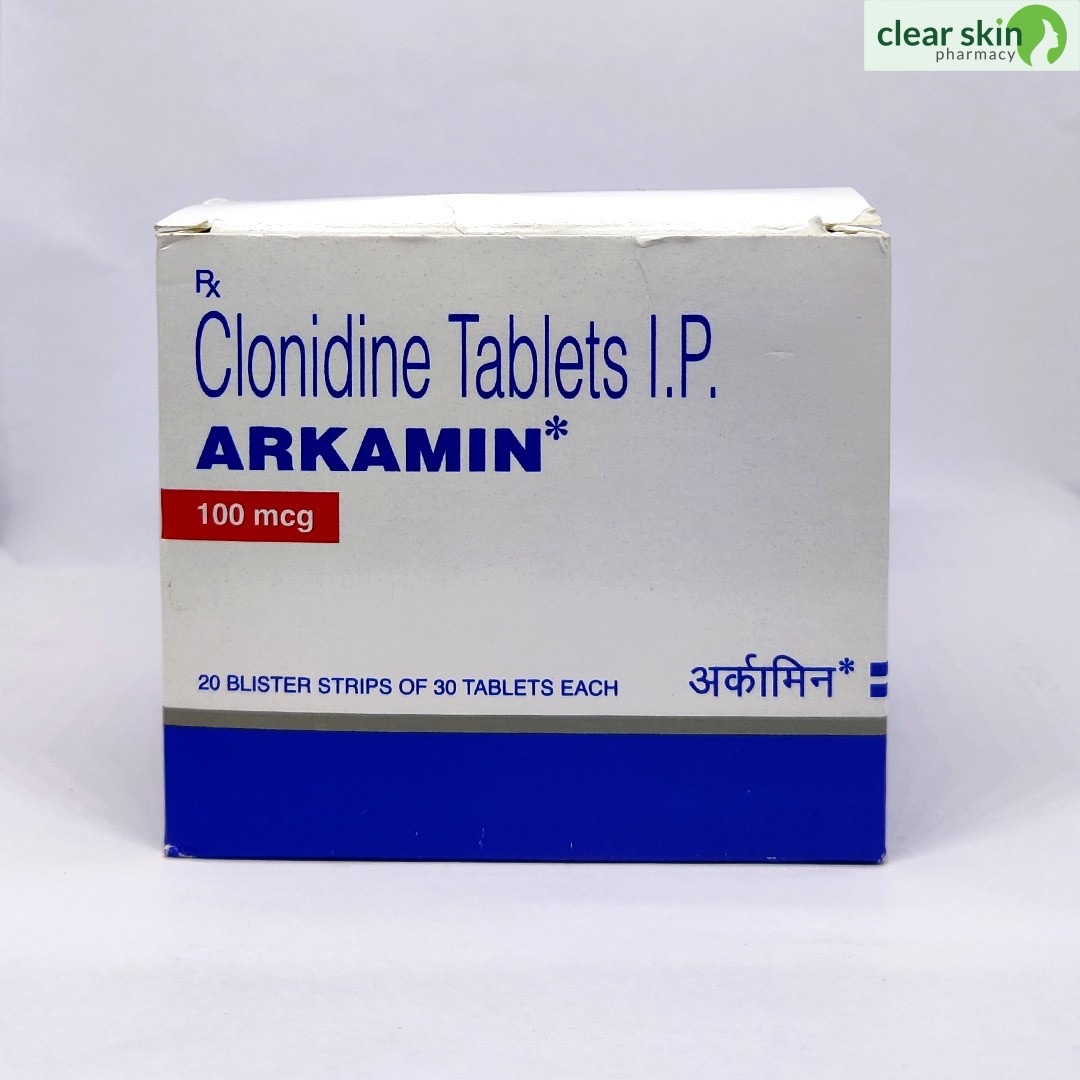



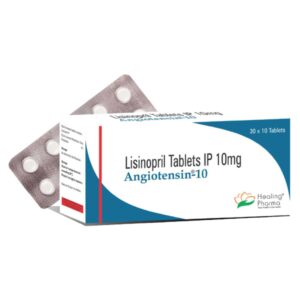
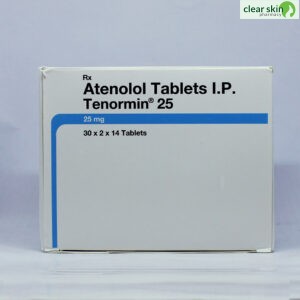
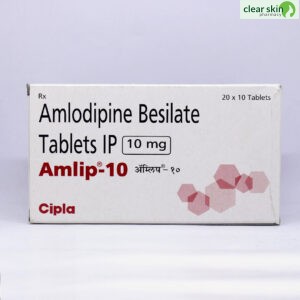
Be the first to review “ARKAMIN 100MCG 30 tablets”